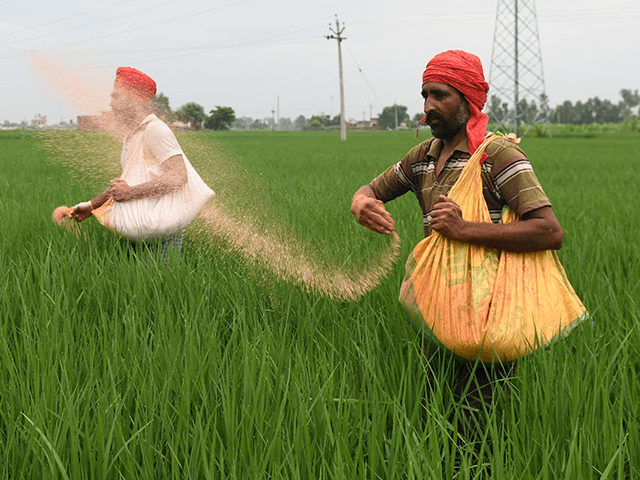Export quotas for fertilizer from Russia have been dramatically increased, despite international sanctions pressure against Russia for its invasion of Ukraine, the Economic Times of India reported Wednesday.
Fertilizer shortages are a concern around the world because of the war, but India is evidently taking steps to ensure its own supply — which will make it possible for India to ramp up grain production and take Ukraine’s lost market share.
According to the Economic Times, Russian export quotas for mineral fertilizers were “increased by almost 700,000 tons,” nitrogen fertilizers were “increased by 231,000 tons,” and complex fertilizers were “increased by 466,000 tons.”
“India has received fertilizer shipments of 3.60 lakh metric tonnes (LMT) from Russia since the start of the Ukraine war on February 24, according to Fertilizer Secretary Rajesh Kumar Chaturvedi,” the report added. Lakh is an Indian term meaning one hundred thousand.
Chaturvedi confirmed India has received shipments of Russian fertilizer both before and after the “current geopolitical situation” began.
The Economic Times reported in March that India received a “flurry of enquiries” from worldwide grain buyers seeking alternatives to Russian and Ukrainian products. Indian producers spoke of ramping up the already-growing wheat industry to “tap the opportunity” presented by the interruption of supply from the war zone.
“We haven’t seen such interest in Indian wheat, at least not in our recent memory,” a global trading firm executive remarked.
India moved aggressively to lock down wheat contracts after “Russia’s invasion of Ukraine upended the global grains trade,” with Egypt a freshly-signed major client, Bloomberg News reported Tuesday.
One of the biggest remaining obstacles facing India is the often subpar quality of its grain. The new Egyptian contract includes requirements for strict inspections of Indian wheat before it is shipped. The administration of Indian Prime Minister Narendra Modi promised the Egyptians their wheat purchases would measure up to quality standards.
“Grains have to undergo cleaning to separate impurities like dust, sand and stones. In India, that process is generally done manually. Cases of Karnal bunt disease – which reduces flour quality and makes the grain unsuitable for human consumption – as well as the overuse of pesticides in some regions also dimmed the appeal of Indian wheat in the past,” Bloomberg noted.
India’s Swarajya magazine, aligned editorially with Modi and his BJP party, said on Tuesday that growing demand for Indian wheat marked the conclusion of “a remarkable journey for a country that was importing foodgrain 75 years ago when she threw the colonial yoke to become independent.”
Swarajya noted another problem to be ironed out in the Indian wheat industry: its tendency to overproduce, stockpile, and lose grain to spoilage because of distribution bottlenecks.
After cautioning that it would seem cruel to “rejoice” in an opportunity created by Russia’s savage attack on Ukraine, the article noted that war and business have always been interrelated, and India should take some advantage of the confluence of rising demand for its agricultural products with discounted prices for Russian oil and fertilizer – especially since waves of inflation flowing from the Ukraine conflict could soon damage the economies of both India and its customers.

COMMENTS
Please let us know if you're having issues with commenting.